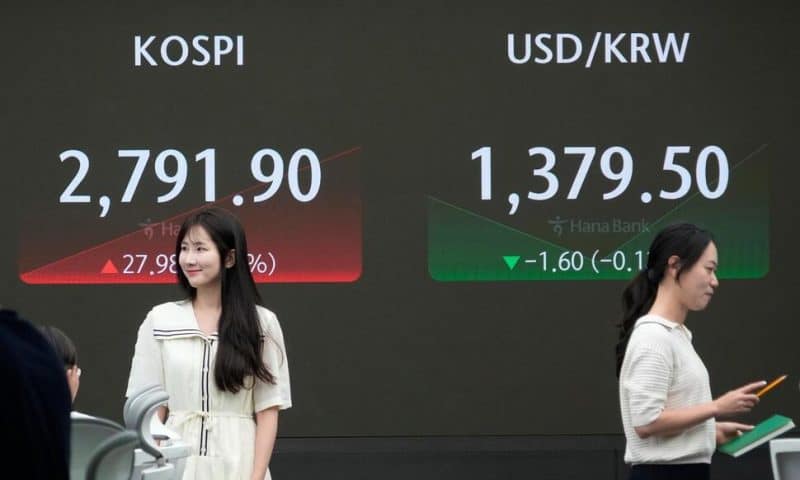Global stocks are mixed after U.S. benchmarks ticked to more records following the latest signs that the U.S. economy may be slowing without falling into recession
HONG KONG — World stocks were mixed on Wednesday after U.S. benchmarks ticked to more records following the latest signs that the U.S. economy may be slowing without falling into recession.
The future for the Dow Jones Industrial Average was down 0.1% while that for the S&P 500 rose 0.1%. U.S. markets are closed on Wednesday in observance of Juneteenth.
European equity markets opened lower. In London, the FTSE 100 lost 0.2% to 8,177.86 after data showed that British inflation fell to the central bank’s 2% target for the first time in nearly three years. The data also backed the market’s expectation that the Bank of England would hold the rate at 5.25% in the coming meeting on Thursday.
Germany’s DAX slipped 0.1% to 18,109.65, while the CAC 40 in Paris shed 0.2% to 7,615.76.
Tokyo’s Nikkei 225 index climbed 0.2% to 38,570.76 as Japan’s trade data for May showed exports rose 13.5% while imports were up 9.5% from a year earlier, pushed higher by rising prices and the weaker value of the yen against the U.S. dollar.
Minutes from the Bank of Japan’s latest policy meeting showed a debate among its decision makers over whether the yen’s weakness may push inflation still higher. Governor Kazuo Ueda has hinted at raising the benchmark interest rate in coming months, depending on economic data at the time.
“Moves in the Nikkei have reflected much indecision in place, with the index trading in a broad consolidation phase thus far,” IG Asia said in a commentary.
The Hang Seng in Hong Kong added 2.9% to 18,430.39, while the Shanghai Composite index lost 0.4% to 3,018.05 after the head of China’s securities watchdog said at a financial forum in Shanghai that the agency would be enhancing oversight of all financial activities to prevent potential risks.
In Sydney, the S&P/ASX 200 edged 0.1% lower to 7,769.70. South Korea’s Kospi surged 1.2% to 2,797.33.
Elsewhere, Taiwan’s Taiex gained 2%, while Bangkok’s SET fell 1%.
On Tuesday, the S&P 500 added 0.3% to 5,487.03, setting an all-time high for the 31st time this year. The Nasdaq composite edged up by less than 0.1% to 17,862.23. The Dow Jones Industrial Average gained 0.2% to 38,834.86.
Nvidia once again was the star, gaining 3.5% and acting as the strongest force pushing the S&P 500 upward. It lifted its total market value further above $3 trillion, again.
The Commerce Department reported that retail sales rose 0.1% in May, below the pace that economists projected, while April sales were revised downward — a 0.2% decline, from unchanged.
That might signal that the main engine of the U.S. economy, spending by households, is cracking. Inflation is still high, even if it’s slowed since its peak, and lower-income households in particular are struggling to keep up with higher prices.
In other dealings Wednesday, U.S. benchmark crude oil gave up 15 cents to $80.56 per barrel in electronic trading on the New York Mercantile Exchange.
Brent crude lost 17 cents to $85.16 per barrel.
The dollar fell to 157.76 Japanese yen from 157.87 yen. The euro slipped to $1.0736 from $1.0738.

